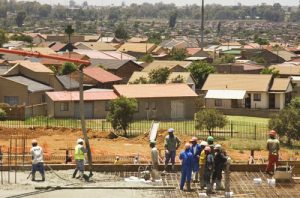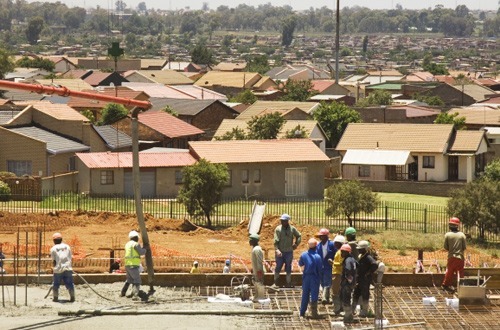
The City of Johannesburg is giving a better twist to the system of tenders. The R1 billion Jozi@Work project will design small “work packages” that function on similar principles as a tendering process, but it will allow more contractors to deliver services for the CoJ
“This is not a programme for a chosen few. It’s not a get-rich-quick scheme,” said Bongani Mabuse, Priority Projects Manager at the Office of the Mayor.
“You just need a South African ID or a work permit if you’re a foreigner.”
Mabuse emphasized that the project requires no capital, tools or equipment to participate as the City will provide that.
Mabuse was speaking in a public roadshow in Braamfontein last week in which the project was explained and introduced to residents of Johannesburg. Members of the community welcomed the project.
Special Advisor of Priority Projects at the Office of the Mayor, Jak Koseff said the City has to allow the division of work to be as wide as possible while not doing away with big tenders altogether. He said by preserving a strong incentive for small, very small and micro enterprises to participate in the system, they will ensure that the procurement is not concentrated on a few businesses.
What is Jozi@Work?
Jozi@Work is the municipality’s programme to outsource products and services in nine different areas of work – such as energy, waste, construction, agriculture, water and sanitation, and ICT – to community-based businesses.
The City estimates that about 1,750 co-operatives and enterprises across different size scales will be created and sustained by the programme. 12,500 members or employees are also estimated to benefit in a space of nine months.
Work packages vs tenders
At the core of Jozi@Work is a unique procurement process known as “work packages”.
A work package are “mini project”. A big project is broken up into lots of smaller projects which are awarded to various SMEs. This is unlike traditional tenders whereby one company is awarded a single large project.
Each work package description outlines the scope of a proposed project including the location, time frame and pricing of that work. Work packages will be advertised by the municipality through regional offices.
When a work package is advertised, interested SMEs or cooperatives will be required to fill out an expression of interest form. SMEs will be awarded work packages based on a scorecard of how close their members reside to the work site and how many potential jobs they will create.
Community mobilisation
City officials say residents only have to organise themselves into cooperatives and bid for work to be done or services to be delivered to areas in which they live.
There are no business plans or tax clearances required for a cooperative to be contracted. Work package documents will be available at regional offices at the request of a cooperative.
Value of work packages
The work packages aimed at the entry-level micro sector will amount to R200k- R500k over a calendar year at the micro level. Small-level cooperatives will get work packages from R5 million to R15 million.
All of these allocations will vary across the different sectors – construction, agriculture, cleaning, etc – as per DTI guidelines.
Read Also: Jozi@Work: Facts and Figures You Should Know
How will work packages be set?
Under the current rules, departments and municipal entities can seek a single provider with an open price to be proposed, a single provider at a fixed price determined by the entity or department or can source the providers as a panel rotating against a fixed value. Koseff said they anticipate the fixed price and panel options will be more prevalent in the early stages of the implementation.
Self-sustainability
The City expects that cooperatives will be self-sustainable by the end of two years and will be thus ‘phased out’ to allow others an opportunity.
Koseff said two years is the current limit for receiving intensive enterprise development services (capacity building, training, mentoring and assistance with compliance. However, there is flexibility to continue to contract and thus receive the transactional support or contractual governance support beyond the 2-year limit.
“People can’t expect to rely on Jozi@work support as a long-term crutch, certainly not when commercial viability and employability of individuals should both escalate dramatically throughout the programme.”
Start of the work packages
These are the dates that work packages will begin to be available at regional offices.
Wave 1 (Sept-Oct 2014): Energy, water, waste, green services, food & agriculture, construction & maintenance.
Wave 2 (Nov-Dec 2014): Roads and transportation, business support & urban management, ICT & digital marketing, apprenticeship programme.
Wave 3 (Jan-Feb 2015): Expansion of business support and urban management sector work packages, expansion of capital & maintenance work packages.










